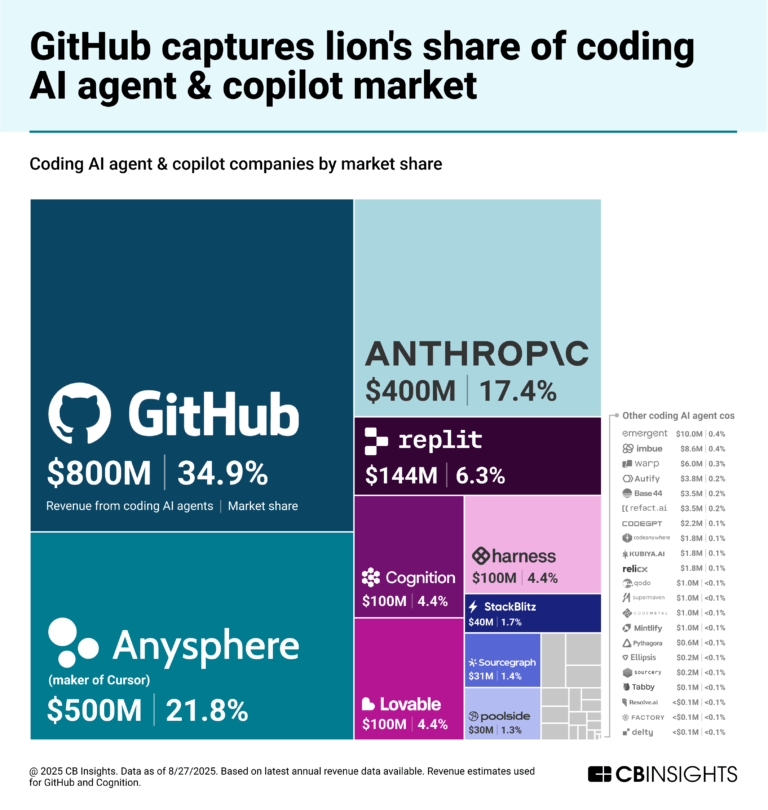Combine & Conquer In The Agentic AI Space - Part II - Who Is Winning In The Vibe Coding Space?
The Rise of Vibe Coding - How prevalent is it?
Today more than 30% of all new code that is being written is AI generated. Google has it at 30%+ already. Microsoft too quotes a similar 30% share. For startups, that number can be as high as 95% in some cohorts of YC. In our own experience, while building The India Portfolio, that 95% holds true.
Safe to say, coding assistants are the first breakthrough AI powered product that has disrupted and recast how work happens within enterprises. And come to think of it - coding assistants are the OG AI agents and agentic workflow platforms all rolled into one. The ability and prevalence of these agents in implementing anything from tiny landing page MVPs to enterprise grade full stack apps from the database to the middle tier logic and the frontend, shows both the maturity and the acceptance of these tools in enterprises.
So who are the big winners of this vibe coding trend?
You may have already heard of a number of these vibe coding success stories, names such as Cursor or Replit or even Indian players like Emergent or Rocket.new/Dhiwise. Perhaps you are familiar with Claude Code, Codex or Gemini CLI. You may even recall Devin, one of the earliest coding assistants, and the hysteria that its launch had unleashed around the imminent end of programming jobs.
But pay close attention to this chart from CB Insights - coding assistants might be raking in ~$2.3 billion in revenues currently, but the reality is that 50% of those revenues are essentially heading to assistants from Anthropic & OpenAI. Claude Code is Anthropic's coding assistant, and GitHub Copilot, until very recently, was closely coupled to OpenAI via Microsoft.

Let us also look at this from the economic value-add angle - in spite of their rapid growth & becoming tightly integrated into enterprise coding, most coding assistants do not have particularly good economics. Data is scarce, but whatever little we know is not encouraging. Around the time of Windsurf's failed acquisition by OpenAI in Aug 2025, this article on Techcrunch revealed that coding assistants were likely to have negative very gross margins with their high LLM API usage being a key reason for that. Months earlier in Jun 2025, Cursor had to abandon its unlimited (albeit tiered) usage $20/month plan and bring in plans that capped usage, linked billing to API usage and also introduced more expensive plans ($200/month). Again, the trigger was said to be their exploding API costs to LLMs.
So, what is the point of all this?
Remember, this blog post is within the ongoing series of how Agentic AI startups need to navigate in a world where LLM giants like OpenAI, Anthropic and Gemini/Google are increasingly moving upwards from owning the LLM layer to also dominating the apps built on top of the LLM layer. Look at how things are turning out in the coding assistants space - this is an agentic AI segment, like we mentioned earlier. Coding assistants have had great success & acceptance even within enterprise workflows (30% or more of new code is AI generated already). Coding assistants do add value of their own into coding by being much better integrated into your development environment (either through their own IDEs or plugins), having direct access to your codebase, managing context and caching, planning out and executing complex tasks, fixing & preventing errors, giving users the ability to switch models depending on the task and so on - LLM APIs are much much constrained on these aspects. And yet, who are the real beneficiaries in the vibe coding space? Directly and indirectly, it is the LLM providers.
The domain expertise of these coding agents is undeniable, they have made coding easy for novices, tubrocharged productivity of expert programmers, they work with multiple models and even pick and choose the right models for the right task. And yet, the LLMs win.
You know where else you hear of these very same strengths - domain expertise, custom knowledge of industries and processes, ease of use plus best in class safeguards, no vendor lockins and optimal use of LLMs and resources? Yes, the agentic AI startups keep saying this. History may or may not repeat within the agentic AI space - but the whole field of agentic AI startups, especially the horizontal ones, need to be careful.
Over to Part III.
Related Reading
Check out the first part in this series, which describes what changes are happening in the world of Agentic AI :
Combine & Conquer - The M&A Playbook for Agentic AI →